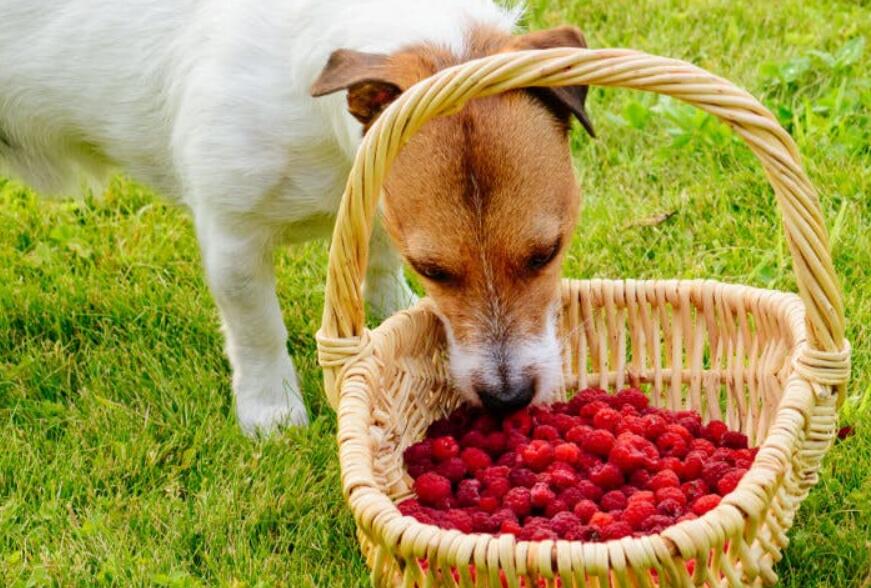Raspberries are a delicious and nutritious fruit that many of us enjoy. As pet owners, we often wonder if we can share this treat with our furry friends. Can dogs eat raspberries? In this article, we’ll explore the potential benefits and how to safely incorporate them into your dog’s diet.
What are Raspberries?
Raspberries are a small, delicate fruit that belongs to the rose family (Rosaceae). They are native to Europe and North America and come in a variety of colors, including red, black, purple, and golden. Raspberries are known for their sweet, slightly tart flavor and are packed with nutrients like vitamin C, manganese, and dietary fiber.
Raspberries are not only enjoyed fresh but are also commonly used in a variety of culinary applications, such as jams, jellies, baked goods, and desserts. They are also popular in the health and wellness industry due to their high antioxidant content and potential health benefits.
Can Dogs Eat Raspberries? Are Raspberries Safe for Dogs?
The short answer is yes, dogs can safely eat raspberries in moderation. Raspberries are non-toxic to dogs and can even provide some health benefits when given as an occasional treat. However, there are a few potential risks to be aware of, which we’ll discuss later in this article.
It’s important to note that while raspberries are safe for most dogs, every dog is unique and may react differently to new foods. Some dogs may have allergies or sensitivities to certain fruits, including raspberries. If you’re unsure whether raspberries are safe for your dog, it’s always best to consult with your veterinarian before introducing them into their diet.

Health Benefits of Raspberries for Dogs
Raspberries are a nutrient-dense superfruit that can offer several health benefits for dogs when consumed in moderation:
1. Antioxidants
Raspberries are rich in antioxidants like vitamin C, quercetin, and ellagic acid, which help protect cells from damage caused by free radicals. These antioxidants may help reduce inflammation and support overall health, especially in senior dogs.
Antioxidants are essential for maintaining a strong immune system and can help prevent chronic diseases like cancer, heart disease, and cognitive decline.
2. Fiber
Raspberries are a good source of dietary fiber, which can help promote healthy digestion and regular bowel movements. Fiber can also help dogs feel fuller for longer, which may be beneficial for weight management. Adequate fiber intake is crucial for maintaining a healthy gut microbiome, which plays a vital role in overall health and well-being.
3. Vitamins and Minerals
In addition to vitamin C, raspberries contain vitamin K, which supports blood clotting and bone health, and B-complex vitamins, which aid in energy production and nervous system function.
They also provide minerals like potassium, manganese, copper, iron, and magnesium. These vitamins and minerals work together to support various bodily functions, such as maintaining healthy skin and coat, promoting proper muscle and nerve function, and supporting a healthy metabolism.
4. Low in Calories
Raspberries are relatively low in calories compared to other fruits, with only about 64 calories per cup. This makes them an excellent treatment option for dogs who are watching their weight or need to maintain a calorie-controlled diet.
However, it’s still important to feed raspberries in moderation and account for their calorie content when calculating your dog’s daily caloric intake.
5. Hydration
Like most fruits, raspberries have a high water content, which can help keep your dog hydrated, especially during hot summer months. Adequate hydration is essential for maintaining proper bodily functions, such as regulating body temperature, transporting nutrients, and removing waste products.
Are Raspberries Safe for Dogs With Specific Health Conditions?
While raspberries are generally safe for most dogs, some health conditions may require extra caution or avoidance of this fruit:
1. Diabetes
Raspberries contain natural sugars, which can cause blood sugar spikes in diabetic dogs. If your dog has diabetes, consult with your veterinarian before offering raspberries or any other fruit treats. They may recommend limiting or avoiding raspberries altogether to help manage your dog’s blood sugar levels.
2. Obesity
Although raspberries are relatively low in calories, they should still be given in moderation to overweight dogs. Treats, including fruits, should make up no more than 10% of a dog’s daily caloric intake. If your dog is overweight or obese, work with your veterinarian to develop a weight management plan that includes a balanced diet and appropriate portion sizes.
3. Allergies
Some dogs may be allergic to raspberries or other fruits. If you notice any signs of an allergic reaction, such as itching, swelling, or difficulty breathing, stop feeding raspberries and contact your veterinarian immediately. Allergic reactions can range from mild to severe and may require prompt medical attention.
4. Gastrointestinal Issues
Dogs with sensitive stomachs or pre-existing gastrointestinal issues like inflammatory bowel disease (IBD) may not tolerate raspberries well. The high fiber content in raspberries can exacerbate digestive problems in some dogs.
This will lead to symptoms like vomiting, diarrhea, or abdominal pain. If your dog has a history of gastrointestinal issues, consult with your veterinarian before introducing raspberries or any new foods into their diet.

Potential Risks of Feeding Raspberries to Dogs
While raspberries are generally safe for dogs, there are a few potential risks to keep in mind:
1. Xylitol
Raspberries naturally contain small amounts of xylitol, a sugar alcohol that is toxic to dogs in large quantities. However, a dog would need to consume an extremely large amount of raspberries (32 cups or more) to ingest a potentially fatal dose of xylitol.
The risk is much higher with products that contain xylitol as an artificial sweetener, such as sugar-free gum or candy. Always check the ingredient list of any human food or product before giving it to your dog to ensure it does not contain xylitol.
2. Digestive Upset
Consuming too many raspberries can lead to digestive issues like vomiting, diarrhea, or constipation due to their high fiber content. Introduce raspberries gradually and in small amounts to avoid upsetting your dog’s stomach.
If your dog experiences any persistent digestive issues after eating raspberries, discontinue feeding them and consult with your veterinarian.
3. Choking Hazard
Whole raspberries can pose a choking risk, especially for small dogs and puppies. To minimize this risk, smash the berries or cut them into smaller pieces before feeding them to your dog. Always supervise your dog when giving them any new food or treat to ensure they are consuming it safely.
4. Pesticides and Contaminants
Raspberries, like many other fruits, may be treated with pesticides or other chemicals during the growing process. These substances can be harmful to dogs if ingested in large amounts. To minimize the risk of exposure, always thoroughly wash raspberries before feeding them to your dog, or opt for organic raspberries when possible.
How Many Raspberries Can I Feed My Dog?
The appropriate serving size of raspberries depends on your dog’s size and weight:
- Extra-small dogs (2-20 lbs): 1-2 raspberries
- Small dogs (21-30 lbs): 2-3 raspberries
- Medium dogs (31-50 lbs): 5-6 raspberries
- Large dogs (51-90 lbs): Small handful of raspberries
- Extra-large dogs (91+ lbs): Handful of raspberries
Remember, treats should make up no more than 10% of your dog’s daily caloric intake, with the remaining 90% coming from a complete and balanced dog food. It’s essential to factor in the calories from raspberries and any other treats when calculating your dog’s daily calorie requirements to avoid overfeeding and maintain a healthy weight.
How to Safely Feed Raspberries to Dogs?
To ensure your dog’s safety when feeding raspberries, follow these guidelines:
- Wash thoroughly: Always wash raspberries before giving them to your dog to remove any dirt, pesticides, or other contaminants. This helps reduce the risk of exposure to harmful substances that could cause digestive issues or other health problems.
- Remove stems and leaves: Take off any stems or leaves, as these can be difficult for dogs to digest and may pose a choking hazard. The stems and leaves of raspberries are not toxic to dogs but can cause gastrointestinal irritation or blockages if consumed in large amounts.
- Introduce gradually: When introducing any new food into your dog’s diet, start with a small amount and monitor them closely for any adverse reactions. If you notice any signs of digestive upset or allergic reaction, discontinue feeding raspberries and consult your veterinarian. Gradual introduction allows you to assess your dog’s tolerance to raspberries and minimizes the risk of digestive issues.
- Feed in moderation: Stick to the recommended serving sizes based on your dog’s weight, and remember that raspberries should be given as an occasional treat, not a staple of their diet. Overfeeding raspberries can lead to digestive problems, weight gain, and other health issues.
- Avoid processed raspberry products: Do not feed your dog raspberry jam, jelly, or other processed raspberry products, as these often contain added sugars and artificial ingredients that can be harmful to dogs. Stick to fresh, whole raspberries to provide the most nutritional benefits without the added risks.
Creative Ways to Feed Raspberries to Dogs
There are several ways you can incorporate raspberries into your dog’s diet:
- Whole or mashed: You can feed raspberries to your dog whole, smashed, or cut into smaller pieces, depending on their size and preferences. Smaller dogs and puppies may prefer mashed or cut-up raspberries to avoid choking, while larger dogs may enjoy whole berries as a crunchy treat.
- Frozen: Frozen raspberries can be a refreshing and hydrating treat during hot summer months. Just be sure to thaw and break them apart for small dogs to avoid choking. Frozen raspberries can also be a soothing treat for teething puppies or dogs with sensitive gums.
- Homemade treats: You can use raspberries as an ingredient in homemade dog treats, such as biscuits or frozen yogurt bites. Just be sure to avoid adding any sugar, artificial sweeteners, or other harmful ingredients. When making homemade treats, always use dog-safe ingredients and follow recipes from reputable sources.
- Smoothies: Blend raspberries with other dog-safe fruits and vegetables, like bananas or spinach, to create a nutritious smoothie for your pup. Smoothies can be a great way to provide a variety of nutrients in a single, easy-to-consume treat. Just be sure to avoid adding any ingredients that are toxic to dogs, such as grapes, onions, or chocolate.
- Training rewards: Cut raspberries into small pieces and use them as training rewards for your dog. The sweet taste and soft texture of raspberries can make them an enticing and healthy alternative to commercial dog treats. Just be sure to account for the calories from raspberries when calculating your dog’s daily treat allowance.
Are There Any Precautions for Feeding Dogs Raspberries?
While raspberries are generally safe for dogs, there are a few precautions to keep in mind:
1. Consult your veterinarian
Before making any changes to your dog’s diet, always consult with your veterinarian, especially if your dog has any pre-existing health conditions or allergies.
Your veterinarian can provide personalized guidance based on your dog’s individual needs and help you determine if raspberries are a suitable treat for your furry friend.
2. Avoid processed raspberry products
Do not feed your dog raspberry jam, jelly, or other processed raspberry products, as these often contain added sugars and artificial ingredients that can be harmful to dogs.
Processed raspberry products may also contain xylitol, an artificial sweetener that is toxic to dogs, even in small amounts. Always read the ingredient list carefully and avoid giving your dog any human foods or products that contain xylitol or other harmful substances.
3. Monitor for adverse reactions
When introducing raspberries or any new food into your dog’s diet, watch for signs of digestive upset, allergic reaction, or other adverse effects. Symptoms to look out for include vomiting, diarrhea, excessive gas, bloating, itching, hives, swelling, or difficulty breathing.
If you notice any concerning symptoms, stop feeding raspberries and contact your veterinarian immediately for guidance and treatment.
4. Consider your dog’s individual needs
Some dogs may have specific dietary requirements or restrictions based on their age, size, breed, or health status. For example, puppies, senior dogs, and dogs with certain health conditions may have different nutritional needs than healthy adult dogs.
Always tailor your dog’s diet to their individual needs and consult with your veterinarian if you have any concerns or questions.
5. Practice good hygiene
When handling raspberries or any other food for your dog, always practice good hygiene to prevent the spread of harmful bacteria or contaminants. Wash your hands thoroughly before and after handling raspberries.
Store them properly in the refrigerator to maintain freshness and prevent spoilage. If you notice any signs of mold, decay, or unusual odor on the raspberries, discard them immediately and do not feed them to your dog.
Related Questions
Can dogs eat other berries?
Yes, many other berries can be safe for dogs to eat in moderation, including blueberries, strawberries, and blackberries. However, it’s essential to remove any stems, and leaves, and ensure the berries are fresh and ripe before feeding them to your dog.
Are raspberries good for diabetic dogs?
While raspberries are low in sugar compared to other fruits, they still contain natural sugars that could potentially affect a diabetic dog’s blood sugar levels. It’s best to consult with your veterinarian before feeding raspberries or any other fruits to a diabetic dog.
Can puppies eat raspberries?
Puppies can eat raspberries in small amounts, but it’s essential to introduce new foods gradually and in moderation. Consult with your veterinarian for age-appropriate serving sizes and to ensure the raspberries don’t interfere with your puppy’s growth and development.
Can dogs eat frozen raspberries?
Yes, dogs can eat frozen raspberries as a refreshing treat, especially during the hot summer months. However, it’s essential to thaw the raspberries completely before serving them to your dog to prevent choking hazards or digestive issues.
Can dogs eat raspberry leaves or stems?
No, dogs should not eat raspberry leaves or stems, as they can be sharp and potentially cause digestive issues or intestinal blockages if ingested. Always remove the leaves and stems before feeding raspberries to your dog.
In conclusion
Raspberries can be a safe and nutritious occasional treat for dogs when fed in moderation and with proper precautions. While raspberries can be a healthy and tasty treat for dogs, they should not replace a balanced and complete diet. Treats should be given in moderation and as a supplement to their regular meals.





